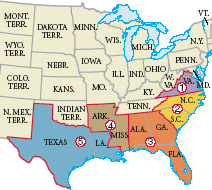1.3.2 Radical Reconstruction and Military Rule

When Johnson continued to urge Southerners to reject the Fourteenth Amendment, every southern state except Tennessee voted it down. “The last one of the sinful ten,” thundered Representative James A. Garfield of Ohio, “has flung back into our teeth the magnanimous offer of a generous nation.” After the South rejected the moderates’ program, the radicals seized the initiative.
Each act of defiance by southern whites had boosted the standing of the radicals within the Republican Party. Except for freedmen themselves, no one did more to make freedom the “mighty moral question of the age.” Radicals such as Massachusetts senator Charles Sumner and Pennsylvania representative Thaddeus Stevens did not speak with a single voice, but they united in demanding civil and political equality. Southern states were “like clay in the hands of the potter,” Stevens declared in January 1867, and he called on Congress to begin reconstruction all over again.
Major Reconstruction Legislation, 1865–1875
| 1865 | |
| Thirteenth Amendment (ratified 1865) | Abolishes slavery. |
| 1865 and 1866 | |
| Freedmen’s Bureau Acts | Establish the Freedmen’s Bureau to distribute food and clothing to destitute Southerners and help freedmen with labor contracts and schooling. |
| Civil Rights Act of 1866 | Affirms the rights of blacks to enjoy “full and equal benefit of all laws and proceedings for the security of person and property as is enjoyed by white citizens” and effectively requires the end of legal discrimination in state laws. |
| Fourteenth Amendment (ratified 1868) | Makes native-born blacks citizens and guarantees all citizens “equal protection of the laws.” Threatens to reduce representatives of a state that denies suffrage to any of its male inhabitants. |
| 1867 | |
| Military Reconstruction Acts | Impose military rule in the South, establish rules for readmission of ex-Confederate states to the Union, and require those states to guarantee the vote to black men. |
| 1869 | |
| Fifteenth Amendment (ratified 1870) | Prohibits racial discrimination in voting rights in all states in the nation. |
| 1875 | |
| Civil Rights Act of 1875 | Outlaws racial discrimination in transportation, public accommodations, and juries. |
In March 1867, Congress overturned the Johnson state governments and initiated military rule of the South. The Military Reconstruction Act (and three subsequent acts) divided the ten unreconstructed Confederate states into five military districts. Congress placed a Union general in charge of each district and instructed him to “suppress insurrection, disorder, and violence” and to begin political reform. After the military had completed voter registration, which would include black men, voters in each state would elect delegates to conventions that would draw up new state constitutions. Each constitution would guarantee black suffrage. When the voters of each state had approved the constitution and the state legislature had ratified the Fourteenth Amendment, the state could submit its work to Congress. If Congress approved, the state’s senators and representatives could be seated, and political reunification would be accomplished.
513
Radicals proclaimed the provision for black suffrage “a prodigious triumph,” for it extended far beyond the limited suffrage provisions of the Fourteenth Amendment. Republicans now believed that only the voting power of ex-slaves could bring about a permanent revolution in the South. When combined with the disfranchisement of thousands of ex-rebels, it promised to cripple any neo-Confederate resurgence and guarantee Republican state governments in the South.
Despite its bold suffrage provision, the Military Reconstruction Act of 1867 disappointed those who also advocated the confiscation of southern plantations and their redistribution to ex-slaves. Thaddeus Stevens agreed with the freedman who said, “Give us our own land and we take care of ourselves, but without land, the old masters can hire us or starve us, as they please.” But most Republicans believed they had provided blacks with what they needed: equal legal rights and the ballot. If blacks were to get land, they would have to gain it themselves.
Declaring that he would rather sever his right arm than sign such a formula for “anarchy and chaos,” Andrew Johnson vetoed the Military Reconstruction Act. Congress overrode his veto the very same day, dramatizing the shift in power from the executive to the legislative branch of government. With the passage of the Reconstruction Acts of 1867, congressional reconstruction was virtually completed. Congress left whites owning most of the South’s land but, in a departure that justified the term “radical reconstruction,” had given black men the ballot. In 1867, the nation began an unprecedented experiment in interracial democracy — at least in the South, for Congress’s plan did not touch the North. But before the spotlight swung away from Washington to the South, the president and Congress had one more scene to play.